Alec: Forgive me for everything. For meeting you in the first place, for taking the piece of grit out of your eye, for loving you, for bringing you so much misery.
Laura: I’ll forgive you if you’ll forgive me
Because tumblr text editor sucks

No one ever expects that they might some day find themselves with a dead woman in their arms, a woman whose face they will never see again, but whose name they will remember.
Javier Marías is one of the most successful Spanish writers, but, as usual, I have waited too long to read his works. I have started last January with his last novel, “Así empieza lo malo” (Thus bad begins); my brother asked me what I wanted for Christmas and I told him that any of Marias’ books would be fine. I would follow at last Arturo Pérez-Reverte advise and read one of the books of his mate Marías. Both are colleagues in the Real Academia Española de la Lengua, and very close friends; so close that they have shared a character in their last novels.
The first thing I thought when I started reading was “Why have I waited so long?” and the second “lucky me, I have still so many of his novels to read!”. Marias is a translator, has been a teacher in Oxford University and is an avid cinephile; one of the characters of “Así empieza lo malo” is a producer of old B-Movies, and the novel is full of cameos of classic Hollywood era actors. The most memorable one is Herbert Lom’s.

My “why have I waited so long” reaction after reading Marias is due to the fact that we share two big commong interests: English literature and cinema. His love for both of them are a constant presence in his works. The title of “Así empieza lo malo” is a quote from Hamlet, Thus bad begins, and worst remains behind, and, another easy recognisable one, from Richard III, gives the title to “Mañana en la batalla piensa en mí”
tomorrow in the battle think on me, and fall thy edgeless sword, despair and die
What has Richard III and his ghosts before the battle of Bosworth have to do with a dead woman? Nothing, apparently, but, on the contrary, everything. Because it is the “ghost” of the dead woman the absolute protagonist of the story narrated by Victor, the man whose arms she died in. BBC4 has produced a two chapter radio drama based on this novel. Unfortunately I was able to record only the second; in this clip you will hear Victor, interpreted by Julian Rhind-Tutt, remembering that night with Marta.
Víctor first reaction to her death is to run away, leaving her dead body in the same flat where her two-year-old son sleeps. Her husband is in a business trip to London; Victor finds the address and the telephone number of his hotel in a note by the phone, but he has not the courage to call and, without knowing why, he leaves the apartment taking with him the note with the phone number and address.
![WP_20150415_006[1]](https://wormwoodscrubs.files.wordpress.com/2015/04/wp_20150415_0061.jpg?w=656&h=368)
Víctor cannot turn the page and forget, even if he hardly knew Marta at all (it was their third date when she died); it is not only remorse for leaving along the child, but something more. He feels himself haunted; Victor uses this word in English when explaining to his friend Ruiberriz why he can’t get rid of Marta’s presence. Had she not died they would probably have split after some more dates, but nevertheless Víctor wants to know everything about what happened after he left. He’s a ghost writer (in this novel not a single word is written by chance) and through Ruibérriz he manages to be asked to write an speech together with Marta’s father for an unidentified member of the royal family (most probably the king himself, mentioned with nicknames as “only the lonely”, “the lone ranger”, or “the one”). Víctor meets other members of Marta’s family, her sister and also the widower, with whom he will have a long chat when the husband will learn that it was Víctor the stranger who was with her that night. He will reach his goal, he will know everything about that night in Madrid, what happened there and what was happening that very night in London while he was watching another man’s son sleeping in his craddle when his little toy planes were fighting noiseless battles in a black sky. That night when Víctor remembered, watching those planes, a sentence murmured by some ghosts in an old movie in his tv during a sleepless night: tomorrow in the battle think on me.
Marias is a master of the stream of consciousness technique; Tomorrow in the battle think on me is a superbly written piece of literature, a must-read.
War and Peace is more than a novel, a 1.400 pages long tale about Humankind, Man, their miseries and glories. A treaty in psychology, history, religion, philosophy. But also, a novel: action, drama, love, jealousy and characters that won’t let you indifferent.
I have just read it for the third time, drawn by the memories that the last bbc radio 4 audiodrama has awoken in me. A nine and a half hours production, broadcasted for the first time on January 1st, and with an extraordinary cast, of the kind that just the Brits can afford: John Hurt as old prince Bolkonsky, Roger Allam as Kutuzov, Simon Russell-Beale as Napoleon, the absolute marvellous Leslie Manville as countess Rostova… Check here complete cast list.
There are several curious and funny videos available on line about the production: Andrei and Natasha’s dance, Dolokhov and Pierre’s duel, the death of count Besukhov, Dolokohv and Denisov ride. The radio drama was recorded on location, as if it was a movie, as John Hurt in this interview. It is also very interesting this post by producer Celia de Wolf revealing more insights of the huge amount of work behind the radio drama.
This post (a rather long one) will be mainly about my favourite character of the novel, prince Andrei Bolkonsky, and his relationship with my second-favourite, Dolokhov. I will try it to be not excessively boring, including screenshots of, if not the most entertaining of all the filmed versions, at least the one more faithful to the original: 1966 soviet colossal “War and Peace”, directed by Sergei Bondarchuk. The screenshots relative to the character of Dolokhov are from 2007 European tv series.
Although the prince Andrei that I imagine when reading the novel has not a definite face (even if I think he’s quite close to Vyacheslav Tikhonov’s), he will for sure have Stephen Campbell Moore voice. I have made this video as a tribute to his work, using some clips of the Russian film with the audio of the radio drama. He is cold and deeply cruel when returning Natasha’s letter, a little bit haughty and aloof when advises Pierre never to marry, moving when repenting of his behaviour towards Natasha, soft, caressing and tender when he sees her again. The music used for mixing the clips is the Variation Nr. 10 of Beethoven’s Kreutzer Sonata, one of Lev Tolstoy’s favourite pieces of music. He even wrote a novel entitled The Kreutzer Sonata , that I strongly suggest you to read. For those afraid of long readings, the book is only about 150 pages long.
War and Peace from Barsine on Vimeo.
ANDREI BOLKONSKY
My favourite character in War and Peace is Andrei Bolkonsky, who proudly forms part of the sacred triad of male literature characters together with Mr. Darcy and Edmond Dantes.
What makes Andrei Bolkonsky attractive? “He was a very handsome young man, of medium height, with firm, clear cut features”. He has been portrayed in the screen by very beautiful men, far more than the Andrei described by Tolstoy: the dashing Mel Ferrer, the handsome Alessio Boni, the elegant Vyacheslav Tikhonov, and in this year’s BBC production, James Norton.


Although he has something that I usually find in men repulsive, small feminine hands, what makes prince Bolkonsky unique is his rich, deep psyche. He is one of those men that “keeps it all within him”; some people of the good society can’t stand him because he’s considered aloof and proud. His never-to-be brother in law, Nicolas Rostov, although not liking “that small and frail but proud man” at all the first time he sees him, “felt with surprise that of all the men he knew there was none he would so much like to have for a friend”.
Andrei’s character evolves during the novel; at the end of it the resulting Andrei is far more attractive and interesting than the one we meet at the very beginning, in Anna Scherer’s party.

The transformation is gradual, marked by several events in his life. The first crucible appears when he is wounded during the battle of Austerlitz and he returns just to see his wife die of childbirth. Something started to change in him when he lied on the battlefield grasping the banner of the regiment, a sight defined by Napoleon himself a beautiful death, while he was watching “that infinite sky”. His friend Pierre visits him in his estates after he’s left the army and the conversations they will have will act as an agent of change in his spiritual transformation. Andrei is intelligent, witty and ironic. When he’s being told of the supposed miracle of a star appearing in one icon of the Virgin Mary, he can’t help asking “And was the Holy Mother promoted to the rank of general?”. In his discussions with Pierre, who in those moment is an enthusiast freemason, he has a more down-to-earth and practical view of matters opposed to the idealistic and rather unpractical projects of his friend. Whereas Pierre ideas will result in nothing, cheated by his overseers, Andrei improvements in his estates will be more practical. Nevertheless, the man who only knew “two very real evils in life: remorse and illness” after those days with Pierre “though outwardly continued to live in the same old way, inwardly began a new life”.
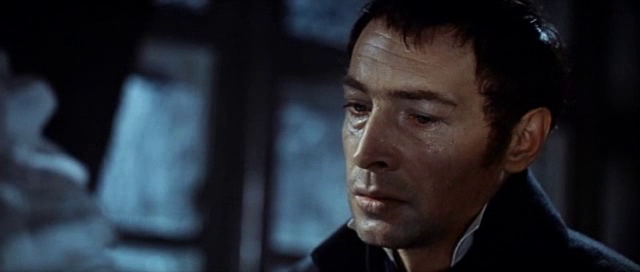
The third movement of his transformation starts after he meets Natascha. Andrei had business with her father and visits one of the country estates. While lost on his thoughts without hearing what the talkative count Rostov says in the carriage “nearer to him ran a dark-haired, remarkably slim, pretty girl in a yellow chintz dress, with a white handkerchief on her head from under which loose locks of hair escaped”.

The effect that Natasha produces in his tormented soul is immediate. “Suddenly, he did not know why, he felt a pang”. That night he hears her from the window of his bedroom. She can’t sleep of pure happiness, she feels so light that she’d want to fly away. The next day he leaves the Rostovs’ estate early in the morning, and when passing by an old oak he saw on arriving three weeks before he realises that some green leaves have grown from the apparently dead tree. Andrei feels like that old tree, something that he thought was dead, is coming back to life, as his own soul is. This is one of the most beautiful and lyric moments of the novel:
“all the best moments of his life suddenly rose to his memory. Austerlitz with the lofty heavens, his wife’s dead reproachful face, Pierre at the ferry, that girl thrilled by the beauty of the night, and that night itself and the moon, and… all this rushed suddenly to his mind.
‘No, life is not over at thirty-one!’ prince Andrei suddenly decided finally and decisively. ‘It is not enough for me to know what I have in me–everyone must now it: Pierre, and that young girl who wanted to fly away into the sky, everyone must know me, so that my life may not be lived for myself alone while others live so apart from it, but so that it nay be reflected in them all, and they and I may live in harmony!”
The new Andrei resulting from this transformation strikes Petersburg society: “he had greatly improved during these last five years, having softened and grown more manly, lost his former affectation, pride, and contemptuous irony, and acquired the serenity that comes with the years”.

The iconic scene of the ball is not as decisive for Andrei and Natascha as the film versions show; Natasha is so excited by her first ball that she has not the time to think about Andrei. On his side, even if thinking the famous sentence (if after dancing with me she talks with her cousin she will be my wife) Andrei rejects that idea immediately as something stupid and will think again of her seriously the day after a meeting at Sveransky’s house. He feels very disappointed with the hypocrsy of Sveransky’s society circle and he calls the day after drawn by curiosity, searching in Natasha that truthfulness that he has guessed she has. When she plays the piano and sings, the moment arrive in which prince Andrei falls definitely in love with her. Tolstoy writes another paragraph of incredible beauty:
“he felt happy and at the same time sad. He has absolutely nothing to weep about yet he was ready to weep. What about? His former love? The little princess? His disillusionments? His hopes for the future? Yes and no. The chief reason was a sudden, vivid sense of the terrible contrast between something infinitely great and illimitable within him and that limited and material something that he, and even she, was. This contrast weighed on and yet cheered him while she sang.”

Andrei is a deep, complex and sensible man, a man of a great moral sense, someone capable of seeing and understanding beyond the surface and with a keen capacity of analysis. He knows that everything may happen during the year that he will be apart from Natasha and he foresees that Pierre would be the only one there capable of helping her as he knows that his pride won’t allow him to forgive her should she fall. Why has he followed so strictly his father’s wishes? Most probably, even if she would have not betrayed him, old prince Bolkonsky wouldn’t have allowed the marriage and Andrej would’ve married her anyway without his father’s consent. He has followed his orders as a dutiful son, even if that will probably end with his happiness, but that’s what he had to do, according to his principles. And when Natasha tries to elope with Kuragin and their engagement is broken, he feels himself hurt, disappointed and misunderstood; because he was the only one capable to see inside Natasha, because “it was that soul that I loved in her… loved so strongly and happily”. Not Kuragin who “only saw in her a pretty and fresh young girl, with whom he did not deign to unite his fate”.
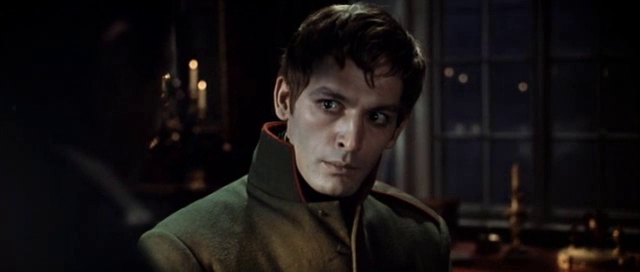
She has failed him not only for the betrayal act itself, but also, and most of all, because of the subject she’s chosen to betray him with. Andrei, alone in his tent before the battle of Borodino, fails also in understanding her; that’s his biggest defeat, the fact that he could have been happy and his pride avoided him to realise it.
He will when it will be too late, dying on a bed a few meters again from her. Then he would understand her soul, her shame, her remorse, and would realise how cruel he was when he rejected her.

Another representative scene of Andrej’s persona, usually ignored by the adaptations of the novel, is when the army is retreating from Smolensk, near his estate of Bald Hills. His family has already retired to another country house (he thinks instead to Moscow) and he rides alone to see it. The place is almost abandoned, part of the retiring troops has sacked the garden. He sees an old peasant sat on a green garden seat, plaiting a bast shoe. Goes to the house, talks of the situation of the estate with the overseerer, and when he returns the old peasant is still there, “like a fly impassive on the face of a loved one who is dead”. When he joins his men in the road, many of them are bathing in a small pond of muddled water, trying to refresh from the summer heat and clean up the dust. He’s loved by his men because he is kind to them, as they don’t remind him his old life, but “as soon as he came across a former acquaintance or anyone from the staff, he bristled up immediately and grew spiteful, ironical and contemptuous”.
Gazing those naked men refreshing in the dirty water: “flesh, bodies, cannon fodder!” he thought, and he looked at his own naked body and shuddered, not from cold but from a sense of disgust and horror he did not himself understand, aroused by the sight of that immense number of bodies splashing around the dirty pond”. The abandoned estate of Bold Hills is a metaphor of his own being; he feels abandoned, useless, squandered; the sight of his naked men is an anticipation of death, everything is meaningless.

Unfortunately, he will in the end lose his last battle against death. Tolstoy has written the most beautiful and touching pages I have ever read about death; although it is not an easy reading, because it touches deeply and leaves you shocked, I suggest you to read “The death of Ivan Iliç”, a short novel. Ivan illiç, as Andrei Bolkonsky experience a dettachment of life before being physically dead.
Andrei falls asleep and he dreams about death while he’s trying desperately and unsuccessfully, to keep it away from his room. Once that it “suddenly happened”, the battle against death lost, Andrej, as Ivan Illiç surrender detaching themselves from the living, even if they still breath. Andrei’s sister, Marja, who finally succeeds in visiting her brother, remains shocked about what she sees, the way he behaves and speaks: insensible, cold, detached. “Had he screemed in agony, that scream would not have struck such horror into Princess Marja’s heart as the tone of his voice”.
He is no longer with them, he has already left, as Natasha will repeat over and over later “Where has he gone? Where is he now?”
BOLKONSKY AND DOLOKHOV
My second favourite character among the around six hundred and thirty present in the novel is Dolokhov. Although he belongs to the group of the “negative characters” (the Kuragins [Anatole and Heléne], Boris Dubretskoy, Natasha’s elder sister Vera or her husband Berg, who measured time not in years but in promotions), he is undoubtedly the most interesting of this group and even of some of the “good” characters as Nikolaj Rostov towards who, I must admit, I feel a very cordial but profound dislike.

Dolokhov is a good-looking, courageous and ruthless infantry officer. “A notorious duellist and a rake” (for further reading about this figure in XVIIIth and XIXth century literature, check out this linnet’s post that offers precious and detailed information on the subject) as demonstrates his first appearance in the novel, when he bets with an English officer that he can drink a whole bottle of rum while keeping his balance on the ledge of a window. Needless to say, he wins. “Dolokhov always wins his bets”, as will recall later Nikolaj Rostov.
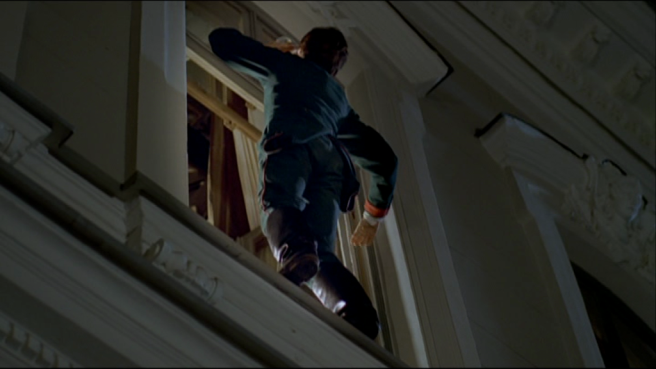
That very night, together with Pierre and Anatole Kuragin, they finish their amusement tying a bear to the back of a police officer, plunging both of them in the river. As a result of that cocky behaviour he will be reduced to the ranks, but promises to win back his position distinguishing himself in battle. As usual, Dolokhov keeps his promises and, after the battle of Austerlitz, he’s an official again.
As I wrote before, although Dolokhov is a villain, he is far away from the archetype represented by Anatole Kuragin and, in some sense, he is more similar to Andrei than any other character in the novel, at least the Andrei before his transformation that will begin in that battle in which both of them coincide, ignoring their existence.
Anatole Kuragin is a vain (“he regarded his own life as a continual round of amusement which someone for some reason had to provide him”), stupid (“in general he thought very little”) even if beautiful piece of flesh, as his sister Helene is. Dolokhov, at least, has a set of non-values of his own, some of them awful as the canonically misogynistic all females are whores except my mother and my sister.

Dolokhov feels a deep resentment; of humble origins, without any family money to rely on, he has to work hard for his position while others have everything they want without an apparent effort. Furthermore, his frustration grows when he suffers two humiliating defeats although he is better than his opposers. He is a cold, professional duellist but he is almost killed by Pierre, someone who held a pistol for the first time. He reputes himself far better than the weak and spoilt Nikolaj (I cannot agree more) but nevertheless Sonia rejects him to keep faith to her love (who will end up marrying prince Bolkonsky’s sister, Marja).
To go back to the Bolkonsky-Dolokhov duo, both make heroic actions in battle, driven, nevertheless, by opposed reasons: Andrei out of honour, Dolokhov from pure selfishness. When wanting to wash his name as promised to general Kutuzov he captures an enemy, and the salvation of a group of comrades is an incident coming from his wish to get away as soon as possible from Austerlitz. Bold as Dolokhov is, he finds out that the way out to salvation crosses an iced mat.
Dolokhov, compared with Andrei, is like a fallen angel in front of an archangel, two beings made of the same mould, but that from a certain point take different paths. Prince Andrei starts his own, as we have seen before, when is laying hurt in the battlefield of Austerlitz. Dolokhov is not purely evil, he has the capacity of doing good, his “angelical side” is hidden: “Dolokhov the brawler, Dolokhov the bully, lived in Moscow with an old mother and a hunchback sister, and was the most affectionate of sons and brothers”. It is only from the mouth of his mother that we learn his name, Fedya. This weird, almost bipolar personality is described also by a comrade in the army “One day he is sensible, well educated and good-natured, and the next he’s a wild beast… in Poland he nearly killed a Jew”. Maybe without Austerlitz Andrei would have become Dolokhov, and the latter with Sonia could have become Andrei. Dolokhov’s love for Sonia was his way of salvation; he hopes to find virtue in women as the only way to be redeemed and once he’s rejected by Sonja, his last hope, he embraces voluntarily and completely evil, being cruel and cold as ice with Rostov in the card game.
” ‘So you are not afraid to play with me?’ repeated Dolokhov, and as if about to tell a good story he put down the cards, leaned back in his chair, and began deliberately with a smile: ‘Yes, gentlemen, I’ve been told there’s a rumour going about Moscow that I’m a sharper, so I advise you to be careful.’ “
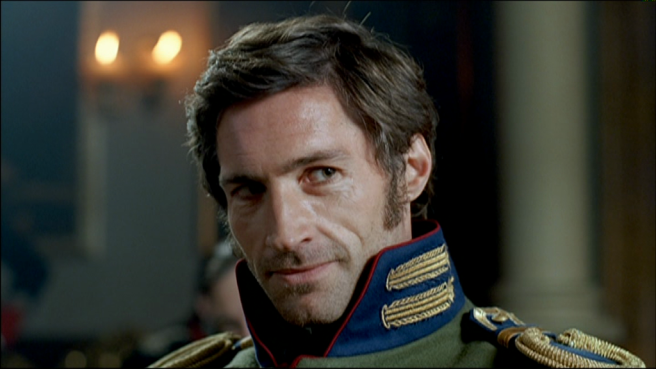
Dolokhov and Andrei are so similar being at the same time so different, that they almost say the same to their friends, Rostov and Pierre. Dolokhov says: “I don’t care a straw about anyone but those I love; but those I love, I love do that I would give my life for them, and the others I’d throttle if they stood on my way […] as for the rest I only care about them in so far as they are harmful or useful. And most of them are harmful, especially the women. “ And Andrei: “they [referring to his father, son and sister] are not others. The others, one’s neighbours, le prochain as you and Princess Mary call it, are the chief source of all error and evil“.
But after Austerlitz and Sonja’s refusal, their roads diverge completely. We have already seen Andrei’s path. We will find again Dolokhov many chapters afterwards, the very night that Natasha falls for Anatole Kuragin. Dolokhov has become a romantic Byron-like figure; he reappears in society after several adventures in the East, it is said that he acted as minister of “some ruling prince in Persia, where he killed the Shah’s brother”. This is the description of what Natasha saw when looking at the faces at the stalls of a theatre: “In the front, in the very center, leaning back against the orchestra rail, stood Dolokhov in a Persian dress, his curly hair brushed up into a huge shock. He stood in full view of the audience, well aware that he was attracting everyone’s attention, yet as much at ease as though he were in his own room.”

He plays an active part in the future Rostov family pains and troubles. It is he who organises in detail the elopement of Anatole with Natasha while advising him very mildly to wait until she is married. But most of all afterwards; during the retreat of the French army from Russia and the guerrilla warfare that followed he commands a group of cavalry hussars to which joins the young Petya Rostov who will be killed by a bullet in his head trying to imitate Dolokhov, of whom “had heard many stories of his extraordinary bravery and of his cruelty to the French”.

Tom Burke will play Dolokhov in this year’s BBC mini series. Undoubtedly one of the most interesting cast choices of the project (together with Stephen Rea as prince Kuragin) in a cast that, on the paper, awakes in me more doubts than certainties.

“Turner, J. M. W. – The Fighting Téméraire tugged to her last Berth to be broken” by J. M. W. Turner – http://www.nationalgallery.org.uk/paintings/joseph-mallord-william-turner-the-fighting-temeraire. Licensed under Public Domain via Wikimedia Commons.

“Turner (film)” di Johnny Freak – fotogramma. Con licenza Copyrighted tramite Wikipedia.
When I want to see a film in the cinema I always have before hand a serious inner debate. I don’t know if the situation I will describe shortly happen also in other countries, but I can assure you that it happens in Italy and in Spain. There’re certain movies that to be watched deserve the big screen but there’s a collateral damage: big screen = cinema = people. If the film you want to see is screened only in five theatres in a city with an official population of three million (more or less), and you can go to the cinema only on the weekend, you will need a big load of patience and endurance, because you can be sure that the audience will be a problem. Last Sunday when I have watched Mike Leigh’s “Mr. Turner” I have suffered what follows:
– people coming fifteen minutes after the screening started
– some of the before mentioned trying to find their exact seat instead of sitting in the nearest place possible, with related shouts “is this the row E?”
– more five minutes other the fifteen to take off coats/hats and so on
– cell phone ringtones (we were very lucky that none of the four people involved followed their conversations)
– sorted snores
– supposedly witty comments (although the diagnose of Mr. Tuner’s housekeeper illness was wrong)
Notwithstanding the above, I have enjoyed the film. You realise from the start that if you want action you’d better dedicate your time and money elsewhere. The films opens with a five minutes long take of Mr. Turner sketching in Holland, surrounded by the yellow light of dawn while two women, one of them carrying two buckets with water, pass by chatting.
Mr. Turner deals with the last twenty-five years of life of the great painter; maybe not the nicest of men and sometimes even despicable. We see sketches of Turner’s life: his trips trying to capture the light and the essence of the sea, his rather chaotic domestic life, from the popular streets of London to the great halls of the Academy of Arts, a parade of humanity in all its variety from his housekeeper (Dorothy Atkinson is simply amazing) to Queen Victoria.
I hope the DVD will be released soon, so I can enjoy the original audio. This film is a luxury for the eyes, loved by the critics (first time I’ve ever seen such a consensus in Rotten Tomatoes) although detested by some viewers. For once in my lifetime, I’m with the critics.
John May is a council worker, and has a peculiar job: he looks for the relatives and organises the funeral of people who have died alone. After a reorganisation in the council he is fired and he takes an special interest in his last case, that will change his life.
A beautiful story of a Mr. Nobody and human relationships. Everything and everybody counts.
There are few movies that I’ve seen more than once in the cinema. As far as I remember, Coppola’s Dracula, The Usual Suspects, Gladiator and now the Hobbit – The Battle of the Five Armies.
Needless to say, spoilers to follow.
I had to watch it again, as there are many details to be aware of in this movie. Bear in mind also that my current inability to focus is so huge that I wasn’t aware during the first watch last December 21st that Thorin draws away on purpose Orchrist to be deadly wounded by Azog; the second and definitive stratagem to defeat the orc. The first one was to make the monster loose his balance in the ice platform, but it didn’t work. The second one is to get wounded, and to die, in order to kill Azog, win the battle, and save his people. Thorin is cunning as Ulysses and, as the king of Ithaca, he suffered from madness surrounded by his men. What were the sirens for the mythological hero, was the gold for the king under the mountain.
My favourite scene of all the film is his conversation with Dwalin in the peak of his gold sickness. Fortunately for me someone has broken the law and I have had the chance to see that scene in English; even if as I wrote in the previous post this is the best dubbing of Richard’s voice that I have ever heard, it is not his and his acting in this scene consists in eyes and voice. Awakened from his reveries by Dwalin he faces his friend, still, motionless, but his eyes move from left to right with the same hectic movement of a maddening lion locked in a cage, insisting on his scheme to hide the gold in the deeper vaults of the mountain. Dwalin insists upon the importance of the lives of the people dying that very moment in battle but Thorin remains impassive, replying with the excuse, heard a thousand times pronounced by kings and rulers throughout history, that those lives are a tiny price to pay compared to what really matters. It is only when Dwalin hints that the crown and the gold has changed him that something triggers inside him. That very moment is the beginning of the end of his sickness, when he turns, bends his head as if crushed by the weight of his crown, incapable of pronouncing his old name with a firm voice. That hushed and broken Thorin Oakenshield followed by a desperately roared I am your king summarises Richard Armitage’s acting: to make look simple something that is really difficult. No histrionics needed. As in the last desperate beg to Dwalin go… before I kill you. A dear friend says that this only scene is worth the price of the ticket, and I cannot agree more.
This second view was in my hometown cinema, in 2D and in the smallest of the two theatres, with no more than a hundred seats. I sat in the fourth row (thank you family with two little and noisy human smaugs that made me abandon the seventh) with no heads before me and the whole screen “for myself”. I thought the viewing experience from 3D to 2D would have been disappointing, but it was not. The quality of the film is nevertheless amazing; it is certainly lost the sensation to form part of the set, to be one of the inhabitants of Lake Town or in the middle of the battle with Bilbo and Gandalf.
The dubbing, as I said was good and fortunately not invasive. The panting and original shouting was there and I was able to hear the dwarf war scream in all its glory. I would like to make to mentions for the rest of the cast: Martin Freeman and Ryan Gage. Even if I have not been able to cry even this time (definitely, blame on the dubbing), the last scene between Bilbo and Thorin were convincing on both parts (even if my favourite Bilbo Thorin scene is the “acorn” one), extremely touching and I felt a little pang inside me and my eyes moistened when Bilbo cried. Ryan Gage’s wicked and mean Alfrid is, allow me the expression, like a fresh breeze of human misery in the middle of such a group of courageous heroes.
As I wrote in my previous post about the film, the two and a half hours literally flew away even if I am not a big fan of the fantasy genre. Personally speaking and strictly from the fangirl point of view, I would have prefer less elves and more dwarves in the story.
Hubby pointed me out when we saw together the film, that the dwarves and specially Thorin in full armour have definitely a very Klingon look, and I agree with him.

And, to end with, a question: have you been able to find PJ? I have not.














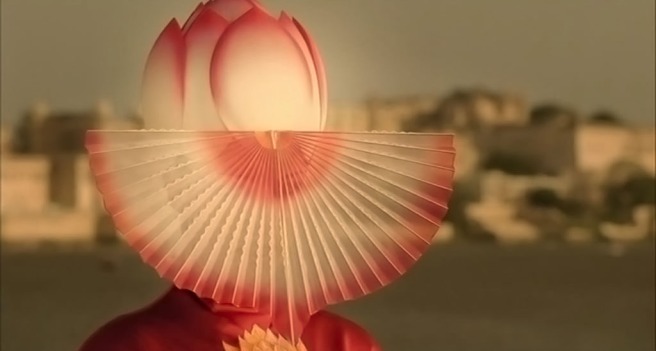
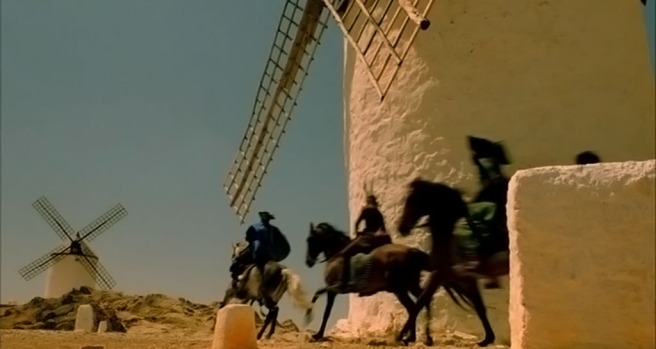








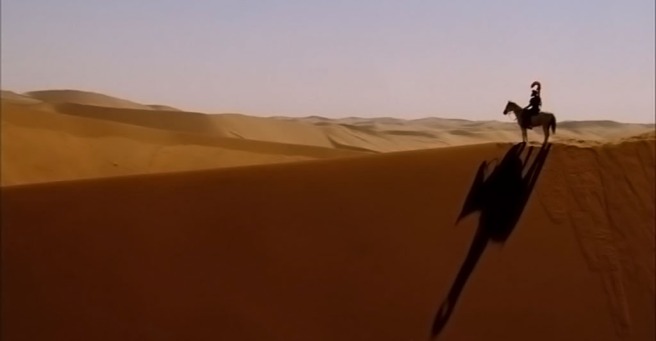

 Several screenshots from one of the most beautiful films I have seen in my life (honestly). A rare and precious gem of cinematography. A beautiful craziness shot in half the world; the Spanish windmill in the screenshot appear less than two seconds in the movie. According to the DVD credits, this film has been filmed in South Africa, United Kingdom, India, Italy, Spain, China, Fiji, Bali, Prague, Romania, Argentina, Chile, Brazil, Turkey, Egypt and Camboia.
Several screenshots from one of the most beautiful films I have seen in my life (honestly). A rare and precious gem of cinematography. A beautiful craziness shot in half the world; the Spanish windmill in the screenshot appear less than two seconds in the movie. According to the DVD credits, this film has been filmed in South Africa, United Kingdom, India, Italy, Spain, China, Fiji, Bali, Prague, Romania, Argentina, Chile, Brazil, Turkey, Egypt and Camboia.
ATTENTION: SPOILERS TO FOLLOW
The story may seem simple: a Romenian little girl called Alexandria (the amazing Catinca Untaru) meets in the hospital where she’s recovering from the fall of a tree when she was picking oranges with her family, a young stuntman called Roy (Lee Pace). Roy tells little Alexandria a short story about Alexander the Great, and then he promises to tell her another one, as he calls it, an epic tale of love and revenge. Roy becomes a modern Sherezade but, instead of telling stories to live, he tells them to die. He uses his story telling to convince Alexandria to bring him as many morphine pills as she can, because he wants to commit suicide. The stunt that brought him to the hospital and that deprived him of the use of his legs was made to impress his former girl friend that has left him for the star of the movie.
The love of Alexandria and her tragic story (her father was killed during a racist riot) will make Roy change the end of his epic and of his own story; she will literally save Roy’s life.
Lee Pace plays two roles in one; his portrait of the body and soul broken Roy is played in a flawless and touching way, the perfect father figure for Catinca Untaru.
The character of “the bandit”, the protagonist of the story he tells Alexandria, has a scent about him of the romantic melancholic hero.
This is one of those films that you can watch over, and over, and over again discovering always a new detail. The surrealist dreamlike world created by director Tarsem to represent the story Roy tells Alexandria is surrealist like a Dali’s painting.
For those of you curious about my husband’s reaction after watching this film: he wants now to watch the two previous Hobbits and even the LODR trilogy. As the old Italian actor Peppino di Filippo repeated in the film “Totò, Peppino e la mala femmina” (Totò, Peppino and the wicked woman): ho detto tutto (I’ve said everything).
Regarding my own reactions, first of all, a confession: I did not cry when Thorin die. I must say that I feel rather shocked and ashamed of myself, given that I am a person with an easy tear in the cinema. I had even a pack of tissues in my lap, but I did not cry. I was moved deeply by Richard Armitage and Martin Freeman’s interpretation of the scene, but my eyes did not water. Shame on me. I wonder if it was due to the fact that Thorin’s death is la crónica de una muerte anunciada, or that the dubbing prevented me to cry.
To be honest, this is the best dubbing I have ever heard of Richard’s voice. The problem is that one of his acting trademarks is his voice; it is impossible to imitate, it’s unique. It’s like trying to imitate the sunrise or the sunset. You can be the skilliest painter in the world, or the best photographer, but you will never be able to render the tiny variations in the atmosphere, the consistency of the air changing as the clouds begin to colour in yellow and red, the imperceptible hissing of the sun hiding behind the sea.
I look forward for the extended DVD version for several reasons; to hear his voice, to watch at least half an hour more of film and to do my usual RW of my favourite scenes. The mad king alone in his broken throne thinking about the deepest vaults where to hide his gold, his doubts about the loyalty of his kinsmendwarfen, the moment when Thorin realises what has become, his ultimate sacrifice, the sad sweet smile before passing away…
For instance, to watch The Hobbit BOFA dubbed and miss a good part of Richard Armitage’s performance. But hubby has beared stoically during all the years that we are together a Turandot, a representation of Othello in English, Coen brothers and Steve McQueen’s films, some chapters of “The Big Bang Theory” and last but not least Interstellar. Next May he will see on stage Ralph Fiennes and Indira Varma understanding one out of five words if he’s lucky enough… therefore I will sacrifice my ears myself for the sake of conjugal equality.
http://player.sky.it/external/cinema/50/224801
INTERIOR – EVENING – DINNER IN BARSINE’S HOUSE
SOUND OF TV IN BACKGROUND – CHANNEL SKY CINEMA
HE.- So, this is the film you want to see, right?
ME.- Yep (Internally Would you please shut up?)
HE.- And you say that this is the last one of three?
ME.- Yep (Internally You usually don’t say a word while eating… WHY Now?)
(Three minutes afterwards)
HE.- Oh! But that’s Mr. Thornton!!!!
ME.- Indeed (Internally: Would… you… please… SHUT THE F*** UP!!!!)
HE.- I must say, the film looks interesting. Who’s that guy? He’s so ugly he doesn’t even need the prosthetics.
ME.- You have seen him in “Sherlock”, he plays Watson there. And he just have the pointed ears as prosthetics in his face during the film.
HE.- He has already pointed ears.
AN HOUR LATER – HUBBY’S AFTER DINNER ZAPPING SESSION
(Frantic scrolling of channels stops at one of Sky Cinema Channels – Hobbit DOS – Scene with Thranduil/Tauriel/Legolas/The Orc)
HE.- I thought that the guy playing the Elf king was that one… that one that plays also the bad guy in Thor…
ME.- Tom Hiddleston?!?!? No, he’s not. (Internally OMG, I really have work to do with you…)
(Minutes later – The dwarfs are in Bard’s house)
HE.- These dwarfs are the ones of Snow White?
ME.- They’re not!
HE.- But they’re seven! Look: one, two, three, four…
ME.- No, there’re thirteen dwarfs in the company.
To cut a long story short: this weekend we will be in the nearest cinema with 3D screen to watch “The Hobbit – Battle of Five Armies”. I must confess that compelling hubby to watch “Interstellar” has been a successful Machiavellian move, I would not say that he’s enthusiast to watch BOFA, but he’s with the right mood now. When our little cat Beta crashes something to the floor he says “There she is, Smaug”.